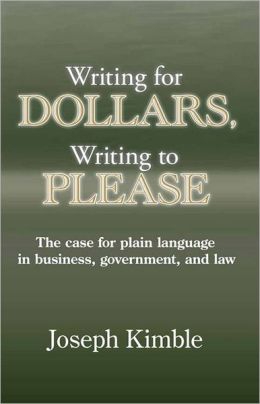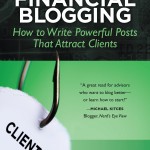Ammo for your plain-language battle with compliance
“Our compliance officer makes us write like this.” That’s the complaint I sometimes hear when I push financial professionals to write better. If you’d like to push back, consider the point made by Joseph Kimble in Writing for Dollars, Writing to Please: The case for plain language in business, government, and law
. Kimble is a lawyer who has taught legal writing for 30 years at Thomas Cooley Law School.
Lawyers and compliance professionals say that legal jargon is necessary to protect your firm. However, Kimble suggests that jargon may be part of the problem. How’s that? Readers often fail to understand legalese and other jargon. As Kimble says, “…this in turn will be more likely to engender disputes and litigation that never should have happened in the first place.” This makes me think of some of my pet peeves, such as the use of “mitigate.”
Plain language can be a lawyer’s friend. “If anything, plain language is more precise than traditional legal and official writing because it uncovers the ambiguities and gaps and errors that traditional style, with all its excesses, tends to hide,” says Kimble. I agree.
However, even when compliance professionals let writers use plain language in the body of a communication, they may insist on technical terms in the disclosures as a form of protection for the company. Kimble’s book suggests that technical terms are a small part of legal documents—and that would presumably include documents governed by FINRA and the SEC. Those bodies may require certain information, but they don’t normally require specific wording. Rather, legalese just gets copied from old forms and models. In fact, the SEC favors plain language. Kimble mentions the SEC’s plain-English rules and Plain English Handbook as one of the “historical highlights” of the plain language movement.
If you’re looking for evidence of the benefits of plain language, 60+ pages of Kimble’s book are devoted to evidence of how plain language is “saving time and money” as well as “pleasing and persuading readers.” His book is among the sources I mention in “Seven Ways to Talk Your Financial Execs Out of Jargon and Bad Writing” on the MarketingProfs blog.
Disclosure: I received a free copy of this book after mentioning it in another blog post. If you click on the Amazon link in this post and then buy something, I will receive a small commission. I only link to books in which I find some value for my blog’s readers.






Susan – I love this excuse as I made it myself! I now make sure to write in plain English without any pumped up wording that I was required to use before.
Working for myself has its perks!
Dave,
I bet your clients are enjoying your writing more now that you can write using plain English.
Thank you for your comment–and for using plain English!